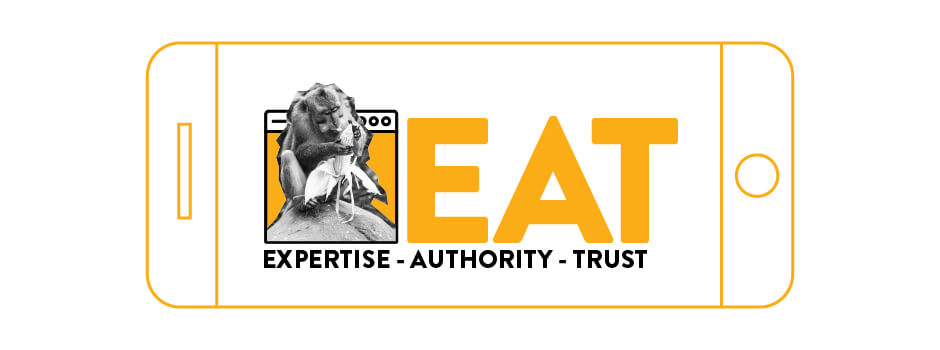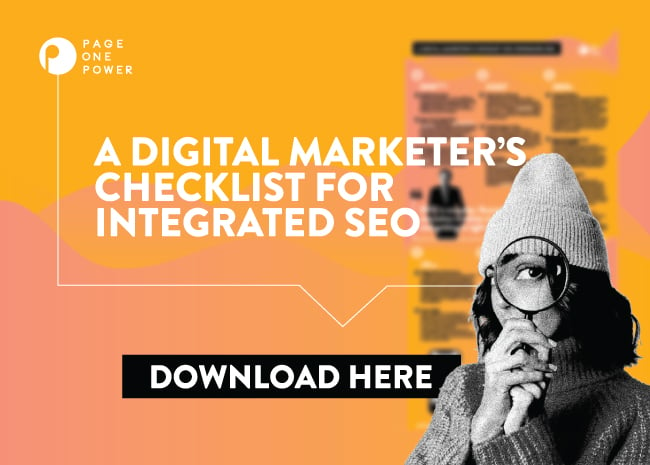GET OUR 2025 PRICING SHEET
A GUIDE TO SEO FOR ENTERPRISE ORGANIZATIONS
Though search engine optimization (SEO) plays an active role in many small businesses' digital marketing efforts, the same can’t always be said for enterprise organizations. However, big brands need SEO just as much as small businesses do, especially if they want to stay relevant in online spaces.
Even though they operate in the same search engine results pages (SERPs), big brands have different needs and challenges than small ones when it comes to organic search. You can’t use the same strategy for a Fortune 500 company as you would for a local business and expect the same results. If you have a big business, a large e-commerce site, or multiple domains for a single business, you’ll need to turn to enterprise SEO.
Enterprise SEO is rooted in the same best practices as traditional SEO — including securing relevant backlinks, producing high-quality content, and ensuring that your site is free of technical errors — but it also encompasses more advanced tactics to deal with the scale and complexity of larger brands. Even with these complications, big brands and domains stand to benefit greatly from organic search if they’re strategic in their SEO efforts.
Here’s what you need to know about enterprise SEO so you can harness its power for your organization:
THE BENEFITS OF ENTERPRISE SEO

Every business can benefit from SEO, but it has a few impacts that are particularly advantageous for enterprise organizations:
IMPROVES VISIBILITY

Increasing online visibility is one of the primary purposes of SEO. In a fast-paced and dynamic online world, it’s all too easy to get lost in a sea of other brands. Getting your name out there, and making sure people remember it, is as difficult as it is crucial.
If you can make your brand prominent in organic search, you have a much better chance at ensuring your brand is visible. When people search for something and your brand shows up, they’ll be able to see your name in the SERP, even if they don’t end up visiting your site the first time they see it. You’re essentially giving users another way to find your organization and building their awareness of your brand.
HELPS WITH BRAND MANAGEMENT

SEO can also help with brand and reputation management. When people search for brand names online, they usually find a variety of results. Some may come from your site or social media profiles, the news, and other third-party sources.
You can influence, but you can’t always control what third-party sources say about your brand. It may be positive, negative, or somewhere in between. Without SEO, these third-party sources may rank above you, making their content the first thing people see in the SERPs.
You can control what appears on your website, social media channels, and the other properties you own or manage. Through these pages, you can share your message with users and foster a positive association with your brand.
If you improve your SEO, you can work to get these pages to the top of the SERP for branded queries. That way, your organization takes up more space and is the first thing users see when they search for your brand.
INCREASES AUDIENCE ENGAGEMENT

As an established organization, you have a target audience who is interested in and potentially loyal to your brand. People know your brand name and they’re probably already searching for it. If you have the content they’re looking for, they may be more likely to pick your name out of the SERPs. This drives more traffic to your domain and increases the chance of a conversion.
SEO can also help you expand that audience. A majority of readers may not be interested in your brand, but most look for information related to your general niche. If you have content that provides that information, it can attract these users to your domain. If you’re lucky, some of these readers may convert, though not all of them will initially. Even still, their engagement with your brand makes you seem more trustworthy, which may positively influence your rankings and help you reach more readers.
Though the impacts of SEO are largely indirect, it all amounts to the possibility of finding more customers and generating more revenue — all while spending less of your marketing budget to do so.
THE ADVANTAGES BIG BRANDS HAVE IN ORGANIC SEARCH

Your organization isn’t the only one vying for the top spot in search. If you want to enjoy the benefits of high rankings, you’ll have to work for them. Luckily, as a big brand, you already have a few things working in your favor in the SERPs:
ONLINE PRESENCE

Your organization has an online web presence, and on the World Wide Web, nothing happens in a vacuum. Search engines are visiting, assessing, and ranking your website. People are using search engines to engage with your brand. Other people and domains are discussing your brand and linking back to your domain.
By virtue of your existence, your organization is part of the search ecosystem. Search engines have determined where your domain stands in the SERPs. Depending on the size and standing of your organization, you may be able to enjoy some of the benefits of high rankings without working for them.
If you can do well without trying, imagine what could happen with just a little bit of effort.
There aren’t any guarantees in search, but if you have this good of a head start, the sky's the only limit on your potential success.
AVAILABLE RESOURCES

As an enterprise organization, you have the resources to put toward SEO that small businesses can only dream of. This isn’t limited to money, but also includes the expertise of your marketing department, employee bandwidth, and internal information, such as customer data.
Of course, these resources won’t make or break your SEO efforts. It’s more important to use whatever resources you have wisely than it is to have myriad resources. But because you have more, you can do more — and see better results in the SERPs because of it.
ESTABLISHED REPUTATION

Perhaps the biggest advantage you have over startups and small businesses: your brand is a household name. Your organization is established in your industry and people associate your name with the niche you operate in, which is invaluable in the current landscape.
In recent years, search engines have placed increasing emphasis on expertise, authoritativeness, and trustworthiness (E-A-T). Essentially, searchers and search engines alike want accurate content to be created by subject-matter experts and hosted on relevant, reputable domains. E-A-T is not a ranking factor in and of itself, meaning it won’t directly affect your ability to rank.
E-A-T is an important way to understand what search engines believe to be important when it comes to ranking content. Your content will struggle to rank if you have low E-A-T on a given subject. Conversely, it will be much easier to rank with a higher E-A-T.
When the public considers you to be an expert in your niche or otherwise trusts your brand, it won’t be as difficult to build up your E-A-T in organic search. And when that’s the case, it isn’t quite as hard to rank for informational queries and long-tail keywords, even if the space is highly competitive.
In other words, you’ve laid the foundation for high E-A-T because of your business’s previous success. It won’t be as difficult for you to successfully build upon that foundation as it would be for a new or lesser-known business.
These advantages don’t speak to your unique selling point or the other qualities that make your business great, which may also benefit your SEO efforts. Any way you can distinguish your brand from others will serve you well as you work to overcome the more challenging aspects of SEO.
THE CHALLENGES FACING BIG BRANDS IN ORGANIC SEARCH

Even if your business is poised to do well in the SERPs, you need to be aware of some of the most significant challenges facing all enterprise organizations in organic search:
STIFF COMPETITION

Across virtually all niches, organic search is highly competitive. Many businesses understand that many people use search engines, as well as the benefits of SEO. These businesses have adjusted their digital marketing strategies to reflect that understanding.
This means that countless organizations are trying to beat big businesses like yours in search, ranging from your direct enterprise competitors and to the smallest of small businesses. The more competitive a space is, the harder it will be for you to rank.
As time goes on, it will be increasingly difficult to catch up to these SEO competitors, since they have already started doing the necessary work to succeed in search. Implementing an SEO strategy sooner rather than later is the only way you can effectively compete with them.
WEBSITE SIZE

By definition, enterprise sites are large. The sheer size of your brand and its website(s) make SEO a challenge. If there’s an issue at the core of your domain — such as poor mobile optimization or slow load speeds — every single page on your site will suffer in the SERPs. As time passes, these problems will become more ingrained into your domain and do more damage to your SEO performance.
If you do have any major issues on your site that impact your SEO, the problem will likely be challenging, but not impossible, to correct. It’s best to address the issue as quickly as possible, as it will only worsen over time and become more difficult to fix. What’s more, as more time passes, your site’s pages may get pushed further down the SERPs, so they’ll have to work that much harder to gain (or regain) lost rankings.
LACK OF UNDERSTANDING

SEO is complicated, confusing, and wildly different from most other forms of marketing. There is a lot of inaccurate information about the right way to “do” SEO. People in your organization may turn to outdated practices or outright harmful black hat tactics, simply because they don’t know any better.
However, having an incomplete understanding of SEO can be more detrimental to your brand than avoiding search optimization altogether. All missteps, even well-intentioned ones, will directly hurt your efforts. If you aren’t careful, you may stand in your own way and become the largest obstacle your organization faces in organic search.
ORGANIZATIONAL DIFFICULTIES

It’s a tale as old as time, but internal organizational difficulties continue to plague countless enterprise businesses and their marketing activities. This can include, but certainly isn’t limited to, communication problems, siloed departments, slow project movement, and lack of sign-off from stakeholders.
Whatever the problem may be, internal roadblocks complicate the process of pursuing any kind of SEO strategy. Without a plan, you won’t be able to increase your brand’s visibility in organic search, despite the immense value of doing so.
BUILDING AN ENTERPRISE SEO STRATEGY FOR YOUR ORGANIZATION

All enterprise SEO initiatives should be driven by a well-planned strategy that accounts for these challenges, as well as your organization’s strengths. If you know what you want to accomplish and the steps you have to take to achieve that outcome, you’re far more likely to succeed.
STICK TO BASICS

You don’t need to reinvent the wheel to create a solid enterprise SEO strategy. You need content, backlinks, and a technically sound site, just like everyone else. That’s how you demonstrate to search engines that you’ve earned your place in the SERPs, no matter how large or small your brand is.
The biggest difference is simply the scale at which you have to do these things. A small business may only have a few hundred pages on its site to optimize, whereas you may have thousands of pages or multiple domains to contend with. And while you have more pages to worry about, you still have to prioritize quality when doing SEO work.
In your organization, determine the best way to go about this work efficiently without sacrificing quality. Connect with your marketing department (or search team, if you have one) to divide responsibilities, come up with new processes, create templates and outlines, and do anything else that will set your team up for search success. Try not to rush this process. Since this is the basis of all of your work, it’s vital to perfect these SEO fundamentals.
STAY LOCAL

Traditional SEO can improve your brand’s visibility in national or international spaces, while local SEO helps boost your visibility in local markets.
This is a necessity for any business with a physical presence, especially if you have multiple locations. After all, your customers need to be able to find you, and there’s a good chance they’ll look your business up online before they make an in-person trip. If they can’t find accurate information about how to engage with your business, you’ll lose out on customers and conversions — at least, until that information is corrected.
Local SEO is based on geo-targeting and works to associate your business with the location where it’s based. Primarily, you need to make local citations that contain essential information about your business, including your name, address, and phone number. This includes places such as Google My Business, your social media profiles, and online directories like Yelp. Like traditional SEO, it’s crucial to maintain these listings so they’re always up-to-date and aligned with current best practices.
USE THE RIGHT TOOLS

There are countless tools and programs, both paid and free, you can use for every aspect of SEO. As an enterprise organization, many of the popular programs used by SEO agencies and small businesses may not work well for you. Even though they’re mostly good tools, some simply weren’t designed to handle the large size and often complicated structures of enterprise sites.
Research the different tools available. Some popular tools, including SEMRush and Ahrefs, provide unique solutions and customizable plans that are better suited to enterprise organizations. Other tools, like — BrightEdge, Conductor, and seoClarity — were created specifically for enterprise brands. It doesn’t necessarily matter which kind of tool you pick, as long as that tool works well for your needs.
AUTOMATE

Whenever possible, use automation to your advantage. It’s the key to achieving the scale needed for enterprise SEO. Depending on the tools you use and the processes you have in place, you may be able to automate tasks like performance monitoring, content publication, and technical auditing.
That said, much of SEO can’t be automated. Think of automation as just one of the tools in your toolbox. Automation is great for some tasks, but it can’t do everything. Much like trying to use a hammer on a screw, if you try to use this tool for every SEO job, it may end up doing more harm than good. Be strategic about what you automate, so you and your team can focus on the tasks that can only be done by a human.
GET HELP

Finally, don’t hesitate to get help from SEO experts. SEO is challenging, and expert advice and guidance may be what your brand needs to succeed in organic search.
Make sure you find a reputable agency that has experience working with big brands. There are countless SEO agencies out there, and many of them are great at what they do. However, if they mainly have experience with small businesses, they may not have the necessary expertise to create and implement the SEO strategy your organization needs. Take your time to find an agency that can put together a campaign tailored to suit the unique needs of an enterprise organization.
Your brand’s existing reputation isn't enough to reap the benefits of organic search. Don’t waste the opportunities available to you. Take advantage of your myriad resources, make an SEO strategy for your organization, and see what happens in the SERPs.
Services
Resources
Contact Us
We believe in helping businesses find success in search.
Through our partnerships, we help you acquire more business with sustainable link building and strategic content.
Better Links. Better Content. Better Service. Page One Power.
7154 W State Street, Suite 325
Boise, ID 83714

x
2025 PRICING SHEET
Every website is unique. Our link building campaigns are tailored to your specific SEO needs to ensure we utilize the best tactics for your site. In addition, each campaign comes complete with a dedicated project manager who provides full transparency throughout the entire campaign.
Fill out the form to get Page One Power’s 2025 Pricing Sheet to learn more about our services and pricing.
Copyright © 2025 Page One Power. All rights reserved.
